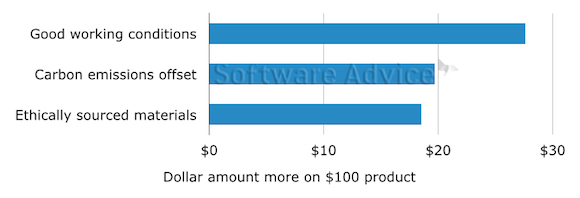Software Advice, a consulting firm recently acquired by Gartner, Inc., has produced a report suggesting that consumers may be judging how “ethical” a company is before buying its products.
“Key Priorities for Ethical Supply Chains,” is a report based on surveys conducted by the consultancy. The report also contains insights shared by researchers at MIT and Harvard.

“Ethical” supply chains invariably mean higher costs for raw materials and labor. It has been estimated, for example, that the cost of an iPhone could effectively double if it were manufactured in the United States, under stricter labor standards. But despite the higher costs of having more ethical supply chains, some believe that it ultimately pays off for companies, as such efforts can improve reputation among consumers and produce greater loyalty from employees.
Some key findings include:
On average, consumers said they would pay 27% more for a product normally priced at $100 if it was produced under good working conditions.
When asked which of three ethical initiatives would make them more likely to purchase a product, consumers were nearly evenly split among improved working conditions (34%), reduced environmental impact (32%) and more involvement in the community (31%).
- When focused on labor efforts, consumers were most persuaded by fair compensation for workers, with 45% saying this would be the ethical effort that would most convince them to pay more for a product.
Forrest Burnson, managing editor for Software Advice, admits that there may be a disconnect between what buys say they will do, and how they actually behave.
“Of course, what people say in a survey won’t always line up with what they will do in real life.,” he says. “All things being the same, I’m not sure that consumers will necessarily pay significantly more for a more ethical product, unless the product is explicitly marketed that way.

Forrest Burnson adds that people do get that “warm glow” when they buy products that are supposedly more ethical.
“So the important takeaway for businesses is not just that they should make their products more ethical, but they should also be proactive in informing the consumer of that fact in their marketing and advertising campaigns,” he says.
Forrest Burnson added that Harvard research suggests people sometimes respond more to marketing campaigns that highlight the ethics of a product compared to marketing campaigns that highlight the features of a product.

“In regard to younger people, it’s plausible to me that millennials are more concerned than previous generations with the ethics behind the products they purchase,” says Forrest Burnson.
Having more choices and more information may also be shaping their buying decisions, he added.
SC
MR

Latest Supply Chain News
- Few executives believe their supply chains can respond quickly to disruptions
- Technology’s role in mending supply chain fragility after recent disruptions
- Tech investments bring revenue increases, survey finds
- Survey reveals strategies for addressing supply chain, logistics labor shortages
- Israel, Ukraine aid package to increase pressure on aerospace and defense supply chains
- More News
Latest Podcast

 Explore
Explore
Topics
Latest Supply Chain News
- Few executives believe their supply chains can respond quickly to disruptions
- Technology’s role in mending supply chain fragility after recent disruptions
- Tech investments bring revenue increases, survey finds
- Survey reveals strategies for addressing supply chain, logistics labor shortages
- Israel, Ukraine aid package to increase pressure on aerospace and defense supply chains
- How CPG brands can deliver on supplier diversity promises
- More latest news
Latest Resources

Subscribe

Supply Chain Management Review delivers the best industry content.

Editors’ Picks





